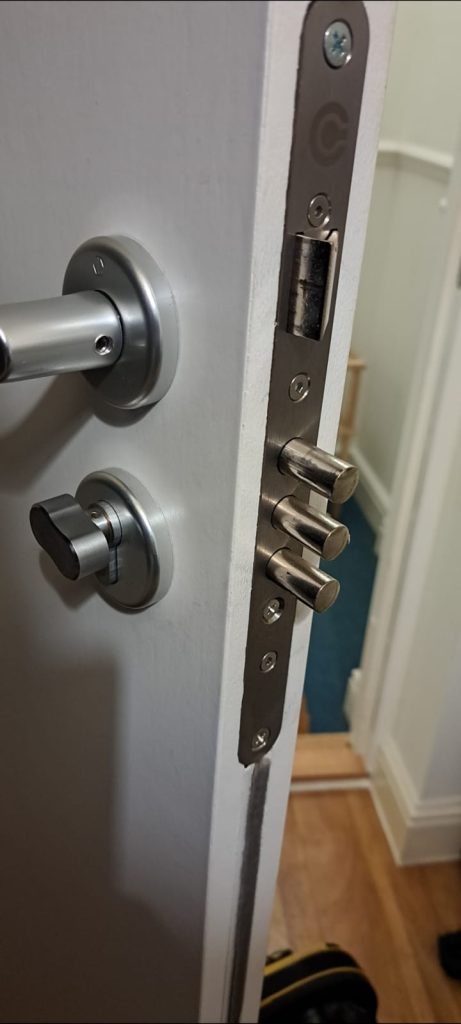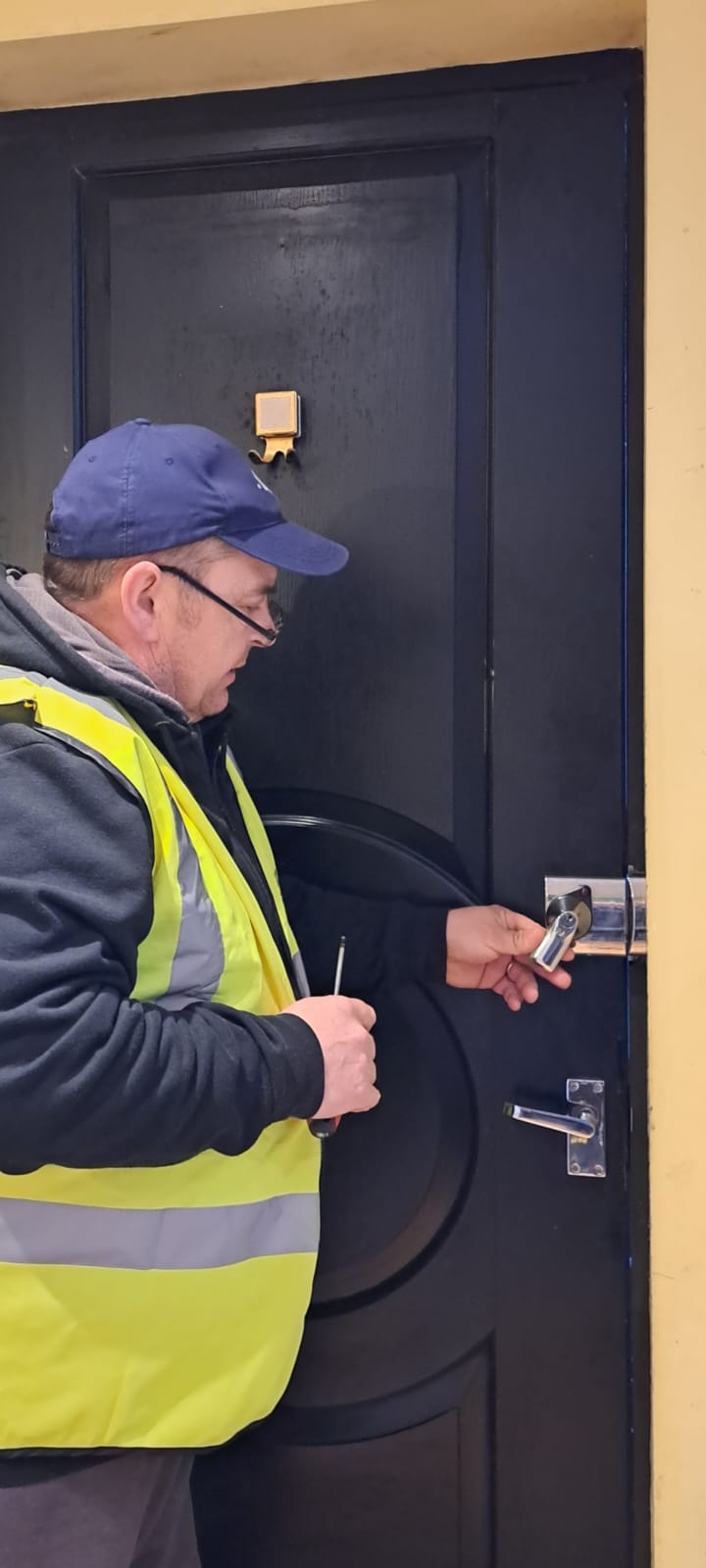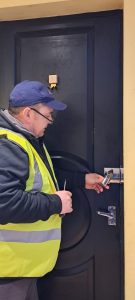| Locksmith Prices & Costs (+ 5 Things You Need to Know To Avoid Overcharging) |
Based on our own experiences and data from aggregate sites, we’ve put together a list of average prices for locksmith services. Before calling a locksmith, it’s worth knowing these prices to ensure you’re not overcharged.
Hourly Rates and Call-Out Charges
The first thing that we need to look at is the hourly rate and call-out charges for locksmith services.
Standard hourly rate: Typically around £65 to £80 during normal working hours.
Minimum call-out fee: £30–£95, which is often included in the hourly rate.
Emergency/out-of-hours call-out: £50–£150, with hourly rates rising to £80 and £200 per hour.
As always, remember these prices are just a guide. Some locksmiths will charge far more than these prices.
Locksmith Service Price Breakdown
Now that you’ve got an idea of the call-out services and how out-of-hours calls can affect pricing, it’s time to break down the typical prices of different locksmith services.
Lockout / Gain Entry
Average price: £70–£130
This price covers a standard lockout service. However, prices can be higher if gaining entry to the premises involves destructive entry or working with a high-security lock. Remember, a skilled locksmith can open most doors without causing damage, which can save you significant sums on a replacement lock.
Change Standard Yale Lock
Average price: £90–£120
The price for changing a standard Yale lock (i.e., a common cylinder rim lock found on many front doors). The above cost includes parts and labour for a basic lock. If you want to install a British Standard lock, you’ll need to pay extra. While people operating on a tight budget might want to keep the price as low as possible, a good quality lock can dramatically increase security.
Change Standard uPVC Lock
Average price: £100–£150
This service typically involves replacing the cylinder lock in uPVC doors. Costs are higher for anti-snap or high-security locks.
Change Anti-Snap uPVC Lock
Average price: £125–£175
Calling a locksmith to upgrade a uPVC lock to an anti-snap model will increase your home security, which is a must in areas or situations where break-ins are common.
Change Mortice Lock
Average price: £115–£165
Mortice locks are typically found on wooden doors. The number of levers (3 vs. 5), British Standard certification, and door modifications are all factors that can increase the price.
Replace Nightlatch
Average price: £85–£95
The price for swapping out a surface-mounted lock (often called a Yale lock) depends on the brand, lock model, and whether the door in question needs adjustment.
Garage Door Lock Replacement
Average price: £80–£90
Lock type (T-handle, euro cylinder, etc.), accessibility, and whether the mechanism is damaged can influence the price. Additionally, some garage doors have multiple locks, which will affect the price of the job accordingly.
Patio Door Lock Replacement
Average price: £90–£100
The cost of replacing locks on sliding or French patio doors depends on the complexity of the lock mechanism, door material, and additional security features.
Rim Cylinder Replacement
Average price: £70–£80
Changing the cylinder in a rim lock is a quick job, but a lot depends on the quality of the lock you’re upgrading to.
Remove Broken Key
Average price: £55–£100
The price above refers to labour costs only for extracting a snapped key from a lock. The severity of the job, lock type, and whether a new cylinder is needed can all increase the price.
Repair Door Lock
Average price: £65–£110
The price for fixing a faulty lock mechanism depends on the type and age of the lock, the extent of damage, and the parts required.
Repair Door Handle
Average price: £40–£60
The final costs of repairing a door handle are dictated by the handle type, door material, and the working status of the lock.
Replace All Locks
Average price: £400–£600
The price above is the average cost of a full home rekey or replacement for two doors and windows.
Emergency Boarding Up
Average price: £200
The above costs are based on securing a property after forced entry or damage. Prices can range based on the size of the area to be boarded, urgency, and time of day.
Auto Locksmith (Car Lockout)
Average price: £65–£149
Auto locksmith prices are dictated by the car make and model, and key type.
Key Duplication
Average price: £17–£49
High-security and car keys are more expensive to duplicate.
High-Security Lock Installation
Average price: £59–£299
Fitting advanced locks involves a higher upfront cost, but may reduce insurance premiums and the risk of burglary. For example, a quality lock can add £100–£500 or so, depending on the lock brand and any advanced features.
Smart Lock Fitting
Average price: from £120
The price above is for labour only. The device will cost extra, with additional costs depending on the complexity of your setup.
Safe Opening
Average price: from £119
High-security safes may require specialist tools and cost more, while destructive entry comes with a premium based on the quality of your safe.
Mailbox/File Cabinet Lock Change/Open
Average price: £59–£74
Opening or replacing a lock on a mailbox or filing cabinet is usually a quick, low-cost job unless the lock is high-security.
Window Lock Replacement
£54–£79
Replacing locks on windows varies based on window type (uPVC, sash, casement), lock style, and number of windows.
The Key Factors That Affect Locksmith Pricing

If you’ve read through the average pricing list, you probably have a flavour for some of the factors that influence locksmith prices. However,
1. Lock Type and Security Level
High-security, anti-snap, or electronic locks cost more to replace or open. This is primarily due to things like the complexity of the work and the cost of associated parts.
Similarly, mortice locks and British Standard locks (BSI Kitemark, BS3621, etc.) are also more expensive to service because of their enhanced security and fitting requirements.
2. Time and Urgency
Out-of-hours, weekends, and bank holidays typically double the hourly rate or add a substantial call-out fee. This is true for most services, including locksmiths. Emergency services, such as lockouts at night, are understandably more expensive.
3. Location
Urban areas have higher average costs due to increased overheads demand, and the time and petrol it costs to reach a business or home. London is by far the most expensive place to find locksmith services,
Some locksmiths add travel surcharges for remote or rural locations. That said, there are plenty of competitive but quality locksmith options in the capital. So, shop around before you make a decision, and you can find a high-quality service without the eye-watering prices.
4. Complexity and Scope
Jobs involving multiple locks, damaged mechanisms, or bespoke security solutions are more expensive. Simple services, such as key extraction or internal door lock repair, are at the lower end of the scale.
5. Labour vs. Parts
Most quotes that you get will exclude parts. If you want high-security locks or smart devices, you can significantly add to your total bill. Always clarify if the quote you received includes both labour and materials. This can save you a lot of grief and confusion when you call a locksmith to do work at your premises.
5 Tips to Avoid Being Overcharged by a Locksmith

Overcharging by locksmiths is a well-documented and common problem in the UK. However, it’s something you are more likely to encounter if you call out a rogue locksmith rather than working with a vetted member of the MLA or similar reputable trade associations.
1. Research and Pre-Select a Reputable Locksmith Before You Need One
When people are facing an emergency like a lockout, they’re much less likely to shop around and find a locksmith with the right blend of professionalism, service, and competitive prices. So, the best thing that you can do is prepare yourself for the eventuality well before disaster strikes.
Research the local locksmith in your area when there is no emergency. Look at the opinions on independent review sites like Google, Trustpilot, or Checkatrade, and save the best option in your phone. This decision alone ensures that you don’t panic and make a rushed decision that you regret during an emergency. What’s more, it gives you a sense of relief if you’re locked out, knowing that the right person for the job is on their way.
2. Always Request a Written, Itemised Quote Before Work Begins
Insist on a detailed quote that includes all potential costs, such as call-out fees, labour, parts, VAT, and emergency surcharges, before any work is started. Get this in writing (email or text) to avoid “bait and switch” tactics where the price is hiked after the job is done. Remember, your locksmith won’t always be able to give an exact price until they come to your premises and assess the situation.
3. Verify Credentials and Ask for Identification
Only hire locksmiths who can provide proof of accreditation, such as membership in the Master Locksmiths Association, business registration, and photo ID upon arrival. Rogue locksmiths often lack proper credentials and may charge excessive fees for poor-quality work.
4. Get Multiple Quotes and Compare
For non-emergency jobs, contact at least two or three locksmiths to compare prices and services. This process can help you spot outliers and avoid locksmiths with inflated charges. While it’s a bit harder to do, even when facing emergencies like a lockout, you can often call around quickly for a rough estimate.
5. Pay by Credit Card and Request a Full Invoice
Where possible, pay with a credit or debit card, where possible, rather than using cash. This option offers greater protection and recourse if you’re overcharged. Always request a full, itemised invoice after the job, so you have a paper trail in case you need to dispute charges or report an issue to Trading Standards or consumer protection agencies.


